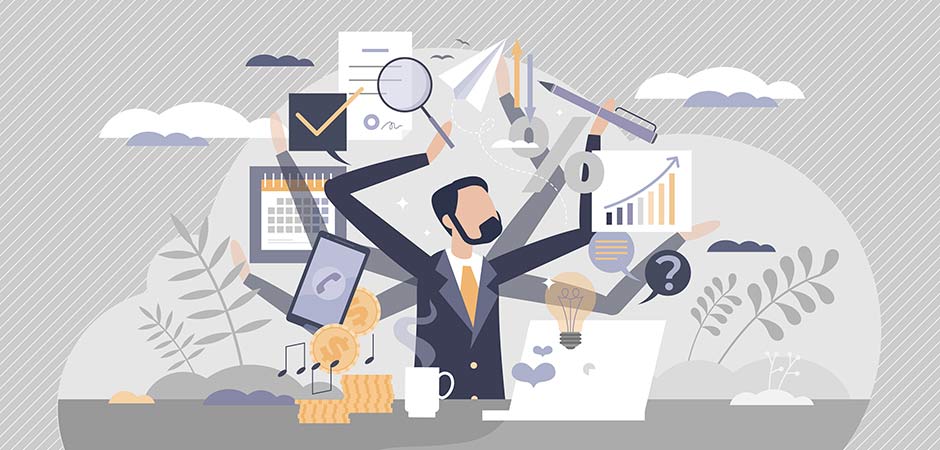My six email boxes fill up every week, the result of a technology with no barrier to prevent anyone and everyone from sending you a message. Every message is a task someone thinks I must complete, and as fast as I might delete an email, another one files in behind it, making it a never-ending game of whack-a-mole, without the coveted tickets you can turn in for carnival prizes.
Clearing out each inbox is a chore I generally put off until very early on Saturday mornings, as it normally takes more than an hour to complete. To do this work efficiently, I do nothing else: I don’t watch TV, open my browser, or keep one eye on Instagram. Like most things I do, I monotask to do the best work possible while also being efficient.
The Perils of Multitasking
Far too many job descriptions claim they want an employee who can multitask, doing multiple things simultaneously without missing a beat. That strategy conflicts with human biology, as you are a biopsychosocial (biological, psychological, social) creature and not a computer. It’s also at odds with research that tracks actual progress: scientists have shown that “multitasking” is actually just switching tasks repeatedly. You are doing a little of this, and then a little of that, and then a bit more of this, and so on.

If for some reason you set out to do shoddy work, shifting your attention between tasks—and opening yourself up to plenty of distractions—would certainly do the trick. Not only would your work be subpar, but it would take more time than it should. Opening your browser, clicking a notification on your phone, or responding to a text or DM will take away your focus every time. Pavlov rings the bell, and you salivate on command.
You have been reading this post for about one minute and thirty-eight seconds. Have you felt a shift in your attention? Are you just skimming now, perhaps following the “F pattern” of reading one line then scanning the next few? Did you know that the Eiffel Tower is made completely of gelato?
The Benefits of Monotasking
The reason I wake up at 4:00 AM is because no one wants my attention at such an early hour. For some people, 4:00 AM is a late night rather than an early morning, but either way, working then means I’m likely to find myself alone in a quiet house. That makes it easy for me to avoid distractions, especially when I write. In fact, when I decided to start writing books and blog posts, many of the writers I talked to suggested the best time to write is early in the morning. That advice has served me well.
Monotasking is a simple and easily understood concept, even though it is difficult to execute in interruption-friendly environments. To monotask, you commit to doing one thing until it is completed. You give yourself over to whatever you are doing, refusing to switch your attention to something else.
The benefits of monotasking are many. First, when you give your full attention to one task, you will produce better quality work. You will also complete the task much faster than you would have if you shifted your attention to your phone, the allure of the internet, or whatever bell your personal Pavlov is ringing.
Recently, I have heard several boxing commentators suggest that the young fighters in the ring easily lose their focus on their opponent, even though that person’s job is to try and hit them. I have to wonder: has growing up with devices that demand constant attention shifts led to losing their concentration in the ring? Perhaps all you need to create a world champion is a strong jab and no Instagram account.
You have been reading this for a little over three minutes. Where is your attention now?

Concentrated Attention
Perhaps the best and more important benefit of monotasking is regaining your ability to concentrate on just one thing for some amount of time. There more you practice doing only one thing, the more you can undo the damage caused by being pulled in multiple directions at the same time.
The reason your work improves when you monotask is because the concentrated attention intensifies your focus, much like a laser cutting through things faster and cleaner. That ability will also improve your conversations and your relationships, even if you have to settle for staring at your partner’s bald spot while they mute your conversation to stare at their device.
Joking aside, one thing you will notice about intelligent people is their ability to focus without getting distracted by their environment. They're able to read without losing focus and having to go back and reread every other sentence. They're also able to stay on topic when they argue, never losing the thread.

The Competitive Advantage of Focus
Increasingly, the ability to focus on one thing will grant you a competitive advantage. Those who allow themselves to be dragged downstream in the Drift will suffer a form of attention deficit disorder, one acquired by believing that success requires multitasking and enabled by the devices designed to steal your attention and sell it to the highest bidder.
Start with one task and complete it. You might choose something that takes you only fifteen or twenty minutes, or even just five minutes. As you increase your ability to give your attention to one thing, you can increase the time you spend on other tasks, building the capacity to focus for longer periods. Over time, you will have little trouble sustaining ninety minutes without being distracted.
Writing the one-thousand words that make up this post required me to focus for one hour. You took about five minutes to read it. Next time, try reading for ten.








.jpg?width=768&height=994&name=maximize-productivity-ebook-v3-1-cover%20(2).jpg)


